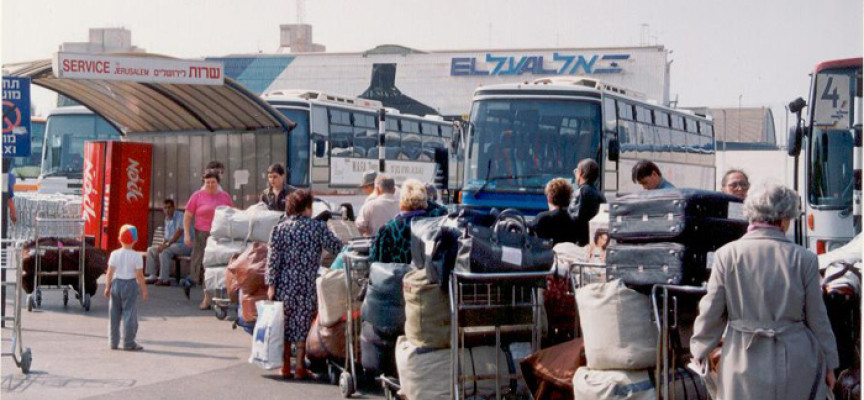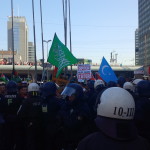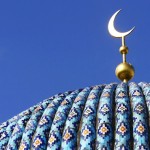In Hebrew it is called “aliyah”. Translated with the Italian word “ascent”, it is the pilgrimage of Jews to Israel. In recent months, from many European countries, including Belgium, Holland, and Germany, but especially from France, there has been an uninterrupted exodus of Jews towards the land of their ancestors. According to figures produced by the Israeli Ministry of Integration, between January 1 and August 31, 2014, 4,566 migrants were registered as departing from France, followed by those from Ukraine (3,252), Russia (2,632), and the United States (2,218). In France, the European nation which is home to the largest community – the third in the world after Israel and the United States – there are more than half a million Jews. If the projections are correct, by 2014 approximately 5,500 of them will leave France, a record since 1948, when the State of Israel was established. “It never happened, at least in the West, that 1% of a Jewish community made its aliyah in the space of a year”, says the director of the French Jewish Agency, Ariel Kandel. The reasons include the economic crisis; the unemployment rate, which is lower in Israel than in France; the strong identity-related and religious attachment to their land of origin; but also a relentless anti-Semitism. Recently, historian Marc Knobel, director of studies at the Council of Representatives of the Jews of France (CRIF), wrote on the Huffington Post that in fourteen years in France about eight thousand anti-Semitic acts were committed, and that now many people give up wearing or displaying the distinctive signs of the Jewish people out of fear. According to the figures released by the Service for the Protection of the Jewish Community (SPCJ), the Jews in France are victims of 40% of physical violence motivated by racism, and the number of anti-Semitic acts and threats has risen from 276 to 527 in the first quarter of 2014: a doubling if compared to the same period last year. This trend has been confirmed in an interview to Le Monde by the French Interior Minister, Bernard Cazeneuve, who said that the government is in constant contact with representatives of the Jewish community who, understandably, are “very worried”.
“Attacks by organized groups against our community venues, planned and targeted attacks against synagogues, acts of vandalism against Jewish shops and terrorist outrages: these are some emerging new forms of violence”, said Roger Cukierman, president of CRIF. “Anti-Semitism – he added – is not only a problem of the Jews”. His declaration is echoed by Joël Mergui, president of the Central Israelite Consistory: “Seventy years after the Holocaust, France and the rest of Europe should wonder why the Jewish community still doubts about its own future”. According to the figures reported by the US magazine Newsweek, 76% of European Jews believe that anti-Semitic hatred has dramatically increased in the last five years, and 30% are planning to emigrate. Those who leave, usually choose the United States, Canada, the United Kingdom, or Spain. Those who remain, make the choice of living with fear.
In ebraico si chiama “aliyah”. Traducibile con l’italiano “salita”, è il pellegrinaggio degli ebrei verso Israele. Negli ultimi mesi da molti Paesi europei – tra cui Belgio, Olanda e Germania, ma in modo particolare dalla Francia – procede ininterrotto l’esodo degli ebrei diretti alla terra dei propri avi. Secondo le cifre prodotte dal Ministero dell’integrazione israeliano, fra il 1° gennaio e il 31 agosto 2014 sono stati 4.566 i migranti registrati in partenza dalla Francia, seguiti da quelli in Ucraina (3.252), Russia (2.632) e Stati Uniti (2.218). In Francia, la nazione europea che ospita la comunità più consistente, la terza al mondo dopo Israele e Stati Uniti, vive oltre mezzo milione di ebrei. Se le proiezioni sono corrette, a lasciare la Francia entro il 2014 saranno in 5.500: un record dal 1948, anno di proclamazione dello Stato di Israele. “Non era mai successo, almeno in Occidente, di vedere l’1 per cento di una comunità ebraica fare la sua aliyah nel giro di un anno”, commenta il direttore dell’Agenzia ebraica francese, Ariel Kandel. Tra le ragioni, la crisi economica, il tasso di disoccupazione (più basso in Israele che in Francia), il forte attaccamento identitario e religioso alla terra d’origine ma anche un antisemitismo implacabile. Recentemente lo storico Marc Knobel, direttore degli studi al Consiglio rappresentativo degli ebrei di Francia (Crif), ha sottolineato su Huffington Post che in quattordici anni in Francia sono stati commessi circa 8mila atti antisemiti e che molti, ormai, per paura rinunciano a indossare o a esporre i segni distintivi del popolo ebraico. Secondo i dati diffusi dal Service de protection de la communauté juive (Spcj), in Francia gli ebrei sono vittime del 40% delle violenze fisiche di tipo razzista, e le minacce e gli atti antisemiti sono passati da 276 a 527 nei primi sei mesi del 2014: il doppio rispetto allo stesso periodo dell’anno precedente. Una tendenza, questa, confermata al quotidiano Le Monde dal ministro dell’Interno, Bernard Cazeneuve, il quale ha dichiarato che il governo è in contatto costante con i rappresentanti della comunità ebraica i quali, comprensibilmente, si definiscono “molto preoccupati”.
“Attacchi in gruppi organizzati contro luoghi comunitari, aggressioni pianificate e mirate contro le sinagoghe, atti di vandalismo contro negozi ebraici e attentati terroristici: quelle emergenti sono nuove forme di violenza”, commenta Roger Cukierman, presidente del Consiglio rappresentativo degli ebrei di Francia (Crif), ma “l’antisemitismo – aggiunge – non è solo un problema degli ebrei”. Gli fa eco Joël Mergui, presidente del Concistoro centrale israelita: “Settant’anni dopo la Shoah, Francia ed Europa devono chiedersi perché la comunità ebraica s’interroga ancora sul proprio futuro”. Secondo i dati riportati dalla rivista americana Newsweek, il 76% degli ebrei europei ritiene che l’odio antisemita sia drammaticamente aumentato negli ultimi cinque anni, il 30% per cento sta pensando di emigrare. Chi parte, sceglie di andare anche verso Usa, Canada, Regno Unito e Spagna. Chi resta, sceglie di convivere con la paura.
Juifs, un nouvel exode
En hébreu il s’appelle “aliyah”. “Montée” en français, il s’agit du pèlerinage des juifs vers Israël. Pendant ces derniers mois, depuis plusieurs pays européens parmi la Belgique, la Hollande et l’Allemagne et notamment la France, continue, ininterrompu, l’exode des juifs vers la terre de leurs aïeuls. D’après les données du Ministère de l’intégration israélien, entre le 1er janvier et le 31 aout 2014, ils ont étés 4566 les migrants enregistrés en départ depuis la France, suivis de ceux qui partent depuis l’Ukraine (3252), la Russie (2632) et les États Unis (2218). Plus d’un demi-million de juifs vit en France, pays européen qui accueil la communauté la plus nombreuse, la troisième au monde après celle d’Israël et des États Unis. Selon les projections, avant la fin du 2014 ils seront 5500 les juifs qui quitteront la France: un record depuis 1948, année de proclamation de l’Etat d’Israël. “Il n’est jamais arrivé, au moins en Occident, de voir 1% d’une communauté juive faire l’aliyah en une année”, a commenté le directeur de l’Agence juive de France, Ariel Kandel. Parmi les raisons sous-jacentes, il y a la crise économique, le taux de chômage (plus faible en Israël qu’en France), un fort attachement identitaire et religieux à la terre d’origine mais aussi un antisémitisme implacable. Récemment l’historien Marc Knobel, directeur des études au Conseil représentatif des institutions juives de France (CRIF), a souligné au Huffington Post que dans les dernières quatorze années en France ont été commis quelque huit-mille actions antisémites et que plusieurs personnes, désormais, renoncent à exposer les signes distinctifs du peuple juif.
D’après les données diffusées par le Service de protection de la communauté juive (SPCJ), en France les juifs sont victimes de 40% des violences physiques racistes, et les menaces et les actions antisémites dans la première partie du 2014 ont doublé par rapport à l’année précédente, en passant de 276 à 527. Une tendance confirmée par le Ministre de l’intérieur français, Bernard Cazeneuve, qui a déclaré à Le Monde comme le gouvernement soit en contact perpétuel avec les représentants de la communauté juive, lesquels se disent “très inquiets”.
“Les attaques en bande organisée de lieux communautaires, les agressions planifiées et ciblées de synagogues, les actes de vandalisme des commerces juifs et enfin les attentats terroristes: il s’agit de l’apparition de nouvelles formes de violence”, a commenté Roger Cukierman, président du Conseil représentatif des institutions juives de France (CRIF): mais, il a ajouté, “l’antisémitisme n’est pas le résultat d’affrontements communautaires. S’en prendre aux juifs, c’est agresser l’ensemble de la société française”. “Soixante-dix ans après la Shoa, La France et l’Europe doivent se poser la question des moyens à mettre en ouvre pour que la communauté juive ne s’interroge pas sur son avenir. Là, elle s’interroge”, a déclaré Joël Mergui, président du Consistoire central israélite de France. Selon les données rapportées par le journal américain Newsweek, 76% des juifs européens pense que la haine antisémite soit dramatiquement augmentée dans les cinq dernières années, 30% est en train de considérer d’émigrer. Ceux qui partent, choisissent de joindre les États Unis, le Canada, le Royaume Uni et l’Espagne. Ceux qui restent, choisissent de vivre dans la peur.
Lorena Leonardi
Latest posts by Lorena Leonardi (see all)
- Jews, a new exodus - 6 ottobre 2014











